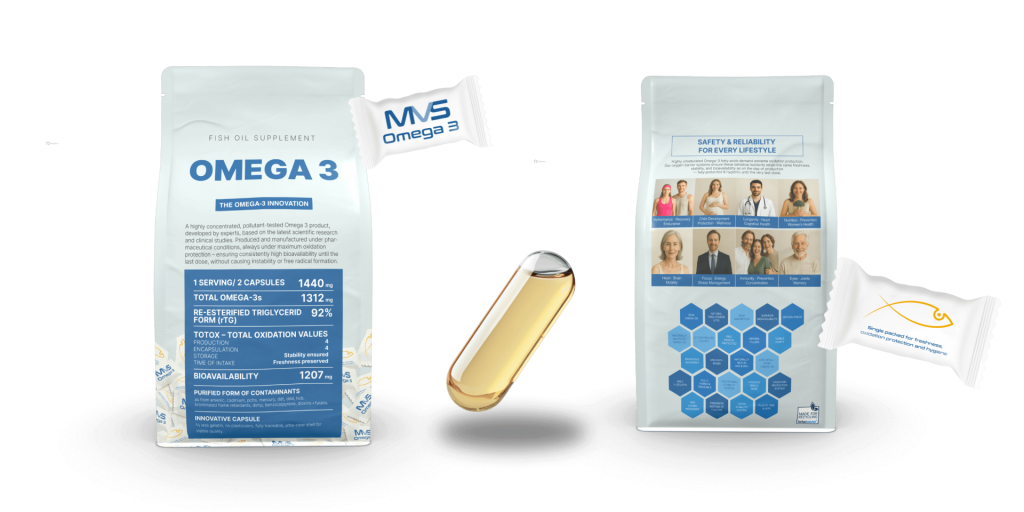Table of Contents
Introduction
Age-related macular degeneration (AMD) is one of the leading causes of irreversible vision loss among older adults. It involves damage to the macula — the central part of the retina responsible for sharp, detailed vision. While genetics, aging, and oxidative stress are well-known contributors, dietary patterns rich in omega-3 fatty acids have been linked in observational studies to a lower risk of developing AMD.
However, the latest large-scale clinical trials show that omega-3 supplementation does not prevent or slow the progression of AMD, though these fatty acids remain essential for retinal structure and overall ocular health.
Omega-3 Benefits for Eye Health and Macular Degeneration
Anti-Inflammatory and Cellular Protection:
Omega-3 fatty acids — primarily EPA (eicosapentaenoic acid) and DHA (docosahexaenoic acid) — have well-documented anti-inflammatory properties. Chronic, low-grade inflammation plays a key role in AMD development, contributing to damage within retinal tissues. EPA and DHA are precursors to specialized pro-resolving mediators (SPMs), such as resolvins and protectins, which help calm inflammation and maintain a balanced immune response in retinal cells. This mechanism supports overall retinal integrity and may complement other nutritional and lifestyle approaches for eye health.
- DHA: The Structural Foundation of the Retina: Among all fatty acids, DHA is uniquely concentrated in the retina, where it forms a critical part of the photoreceptor cell membranes responsible for converting light into neural signals.
- Adequate DHA levels are essential for:
- Maintaining membrane fluidity and photoreceptor stability
- Supporting signal transduction and visual acuity
- Preserving retinal cell resilience under oxidative stress
This structural role is uncontested and underscores DHA’s importance for lifelong retinal health — even though supplementation has not been shown to reverse or halt AMD progression once it begins.

Modulating Oxidative Stress
The retina’s high oxygen consumption and exposure to light make it particularly vulnerable to oxidative damage. Omega-3 fatty acids help support oxidative balance indirectly, not by acting as antioxidants themselves, but by reducing inflammation and influencing cell membrane function. This modulation helps limit the formation of reactive oxygen species and supports the retina’s natural antioxidant defenses.
Supporting Vascular and Endothelial Health
Healthy retinal circulation is vital for nutrient and oxygen delivery to the photoreceptors. Omega-3s have been shown in numerous cardiovascular and endothelial studies to improve vessel flexibility and flow-mediated dilation (FMD) — an important measure of vascular health. While direct evidence for improved retinal microcirculation is limited, these systemic vascular benefits may help support overall ocular perfusion and resilience.
Lipid Balance and Retinal Metabolism:
Disturbed lipid metabolism in the retina contributes to the formation of deposits (such as drusen) associated with AMD. Omega-3 fatty acids help regulate lipid metabolism and maintain healthy cholesterol balance, reducing lipid accumulation within tissues.
Observational data from large population studies, including the Nurses’ Health Study and Health Professionals Follow-up Study, show that diets rich in fish or marine-based omega-3s are associated with a lower risk of developing AMD.
However, randomized clinical trials — including the AREDS2 study — found that omega-3 supplementation alone did not reduce the risk of AMD progression. Thus, omega-3s are best viewed as supportive nutrients for ocular and cardiovascular health, rather than as a specific AMD treatment.
Neuroprotective Effects
The retina is an extension of the central nervous system, and DHA plays a crucial role in maintaining the function of neuronal membranes. Studies demonstrate that DHA supports neuroprotection and synaptic integrity, helping photoreceptor and retinal ganglion cells withstand metabolic stress. While these effects are promising from a mechanistic standpoint, clinical data do not yet show that omega-3 intake directly translates to slower AMD progression.
What Do The Major Studies Say?
- AREDS2 (Age-Related Eye Disease Study 2, 2013): Adding 1 g/day of EPA + DHA to the original AREDS antioxidant formula did not reduce the risk of progression to advanced AMD compared to placebo.
- Cochrane Review (updated 2023): No significant evidence that omega-3 supplementation prevents AMD or slows its progression over five years.
- Observational Evidence: Individuals who consume fish at least twice weekly have a 20–30% lower risk of developing AMD, suggesting dietary omega-3 intake — within a balanced nutritional pattern — may have protective associations.
MVS Pharma’s Innovation – MVS Omega-3 The New Golden Standard
At MVS Pharma, we are addressing the critical shortcomings of today’s Omega-3 supplements by developing a solution that meets the highest standards of purity, freshness, and absorption.

- Oxidation Resistant: Freshness maintained from first capsule to last — proven by strict TOTOX control.
- Highest purity → Our omega-3 oil is manufactured in accordance with strict standards and with pharmaceutical-grade-like care, purified using a sophisticated process.
- Superior absorption: Advanced re-esterified triglyceride (rTG) form.
- Clean & safe: Free from heavy metals, PCBs, microplastics.
- Sustainability: Responsibly sourced small fish, fully traceable.
- German manufacturing: GMP & ISO-certified conditions.
- Double protection packaging: Each capsule is sealed individually, then stored inside protective pouches for unmatched stability.
MVS Omega-3 sets a new benchmark in supplement quality — no shortcuts, no compromises.
Practical Takeaways
While omega-3 supplements are not a treatment for AMD, maintaining optimal levels of EPA and DHA through diet or high-quality supplementation offers several indirect benefits:
- Supports retinal cell membrane structure
- Promotes healthy microvascular function
- Reduces systemic inflammation and oxidative burden
- Contributes to overall cardiovascular and neurological health, which are closely linked to ocular well-being
For individuals at risk of AMD, dietary patterns emphasizing fatty fish (salmon, sardines, mackerel), leafy greens, antioxidants (lutein, zeaxanthin), and lifestyle measures such as smoking cessation and UV protection remain the most evidence-backed preventive strategies.
Conclusion
Omega-3 fatty acids — especially DHA — are indispensable for maintaining retinal structure and supporting overall eye health. While large clinical trials show that supplementation does not prevent or slow AMD progression, consistent intake of omega-3s through diet or high-purity supplements contributes to long-term vascular, neuronal, and retinal integrity.
Incorporating omega-3-rich foods or oxidation-protected, bioavailable formulations such as MVS Omega-3 can help sustain ocular vitality as part of a holistic approach to healthy aging.
Disclaimer:
As a service to our readers, MVS Pharma GmbH publishing provides access to our library of archived content in our blog. Please note the date of the last review or update on all articles. No content on this site should ever be used as a substitute for direct medical advice from your doctor or other qualified clinician.
FAQs
Can taking Omega-3 supplements prevent age-related macular degeneration (AMD)?
Can taking Omega-3 supplements prevent age-related macular degeneration (AMD)?
No — large clinical trials such as AREDS2 and the 2023 Cochrane Review found that Omega-3 supplementation does not prevent or slow the progression of AMD. However, Omega-3s still play a key role in maintaining retinal structure, visual performance, and overall eye health, especially when included as part of a balanced diet rich in fish and antioxidants.
If Omega-3 doesn’t stop AMD, why should I still take it?
If Omega-3 doesn’t stop AMD, why should I still take it?
Omega-3s remain essential nutrients for maintaining retinal structure, healthy circulation, and neurological protection. They complement other evidence-based nutrients — such as lutein, zeaxanthin, zinc, and antioxidants — forming part of a holistic strategy for long-term vision preservation and healthy aging.
How do Omega-3 fatty acids support healthy vision?
How do Omega-3 fatty acids support healthy vision?
Omega-3s — particularly DHA — are vital components of the retinal cell membranes that convert light into vision signals. They support photoreceptor stability, membrane fluidity, and nerve signaling, helping sustain clear and comfortable vision as we age.
Is there a difference between getting Omega-3 from food and from supplements?
Is there a difference between getting Omega-3 from food and from supplements?
Yes. Dietary Omega-3s from fatty fish (like salmon, sardines, or mackerel) have consistently been associated with a lower risk of developing AMD. Supplements can help individuals who don’t consume enough fish maintain optimal EPA and DHA levels — particularly when the oil is fresh, oxidation-protected, and in re-triglyceride (rTG) form for better absorption.
What makes DHA so important for the eyes?
What makes DHA so important for the eyes?
DHA (docosahexaenoic acid) is the most abundant fatty acid in the retina, making up over one-third of the photoreceptor membrane lipids. It supports visual signal transmission, protects against oxidative stress, and promotes the survival of retinal neurons — all essential for healthy vision.
Can Omega-3s help with dry eyes or general eye discomfort?
Can Omega-3s help with dry eyes or general eye discomfort?
Yes. Several studies show that Omega-3 supplementation can improve tear quality and reduce ocular surface inflammation, making it beneficial for people with dry-eye symptoms or those who spend long hours in front of screens.
How much Omega-3 should I take for general eye and retinal support?
How much Omega-3 should I take for general eye and retinal support?
For overall ocular and cardiovascular health, experts typically recommend 500–1,000 mg of combined EPA + DHA per day. Choosing a high-purity, oxidation-protected formula like MVS Omega-3 (92 % rTG form) ensures that every dose delivers stable, bioavailable fatty acids that truly support eye and systemic wellness.


